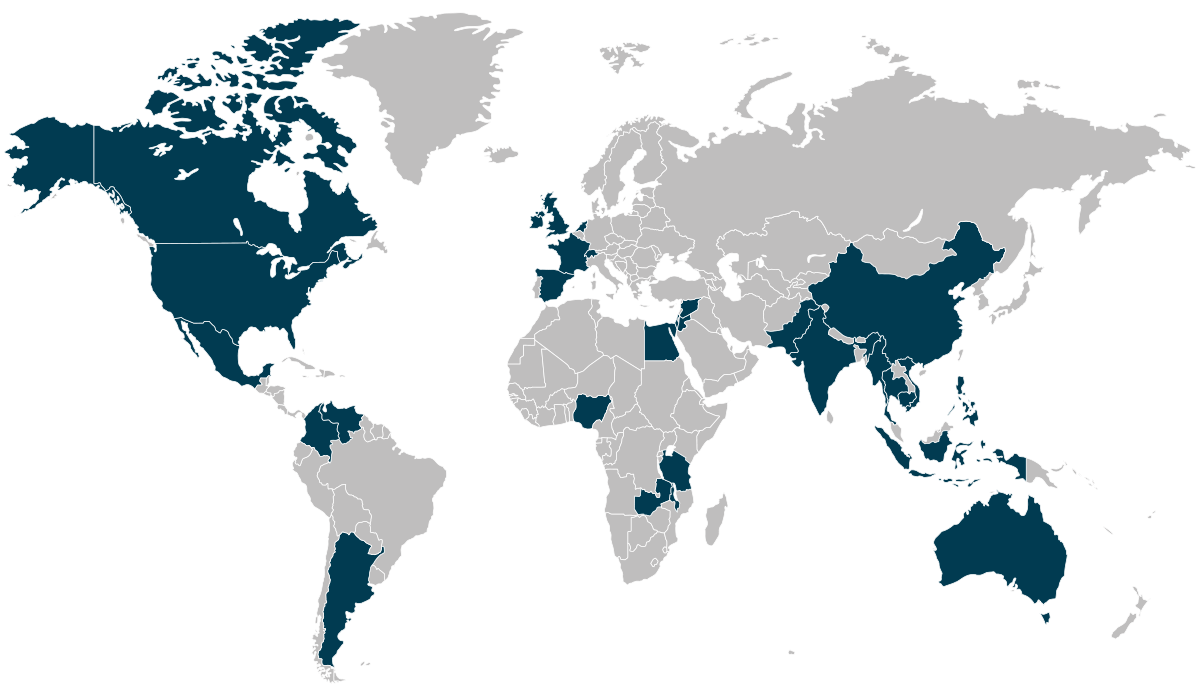Training and Capacity Building
To advance implementation science, it is essential that we grow a cadre of both new and established scientists in the field. The DCCPS Implementation Science Team collaborates with academic institutions, professional organizations, and other funding agencies to coordinate and support numerous training and capacity-building activities. These include a monthly webinar series, training programs, and conferences—both in person (prior to the COVID-19 pandemic) and virtual. It is important to note that the focus on training extends beyond the borders of this country. In fact, at the time of publication, the Implementation Science Team has trained researchers from 38 countries.
In 2010, NCI began collaborating with NIH’s Office of Behavioral and Social Sciences Research, the National Institute of Mental Health, and the US Department of Veteran Affairs to develop a Training Institute for Dissemination and Implementation Research in Health (TIDIRH) to build capacity for dissemination and implementation (D&I) research. First held in August 2011 as a 5-day residential training program, the annual TIDIRH became a hybrid online and in-person training program in Washington, DC, in 2016. The program ceased in 2020, following the creation of NCI’s Training Institute for Dissemination and Implementation Research in Cancer (TIDIRC), which launched in 2018.
Investigators in the highlighted countries have received NCI-led implementation science training.

The annual TIDIRC provides participants a thorough grounding in conducting D&I research—with a specific focus on cancer—across the cancer control continuum. The 2018 and 2019 institutes utilized a combination of online coursework and in-person training, and the most recent TIDIRC, in August 2020, was 100% virtual, due to the COVID-19 pandemic. Faculty and guest lecturers included leading experts in D&I theories, models, and frameworks; intervention fidelity and adaptation; stakeholder engagement and partnership for D&I; research methods and study designs for D&I; and measures and outcomes for D&I. While attendees must be accepted to participate in TIDIRC, all training materials are publicly available online.
The Implementation Science Team has shared its TIDIRC curriculum with colleagues around the world. Partners in Australia and Ireland have held country-specific trainings based on our TIDIRC model, using the NCI-generated resources. We also have shared our TIDIRC materials with colleagues in Mexico, who have translated the materials into Spanish and are using them to deliver a course that is tentatively scheduled for February 2021. In addition, the Implementation Science Team began partnering with the American University in Beirut in November 2020. The training uses the TIDIRC online materials, and Implementation Science Team staff serve as faculty for their online practice sessions.
Other training opportunities have been developed and adapted to meet the diverse needs of trainees. For example, the Mentored Training for Dissemination and Implementation Research in Cancer (MT-DIRC) supported the creation and assessment of a first-of-its-kind program, applying state-of-the-art training methods to build capacity among postdoctoral researchers focusing on D&I research in cancer prevention and control. This NCI/NIH R25 education program at the Washington University in St. Louis trained 55 fellows over the years. The work of the faculty and fellows addressed cancer risk factors and populations with high burden, where substantial intervention knowledge regarding evidence-based programs and policies was not commonly applied, and where a large reduction in cancer mortality would be feasible if the knowledge were more widely implemented into practice and policy. The MT-DIRC concluded in 2019; all of the resources developed for and as part of this project are available online .
The urgent need for expert implementation researchers and mentors and the demand for implementation science training programs unfortunately continue to outweigh the supply. Each year, TIDIRC and TIDIRH, for example, have received hundreds of applications for approximately 40 to 50 slots. Preconference workshops have been standing-room-only, and multi-day intensive programs have quickly reached capacity. DCCPS hopes that sharing the materials online will help meet the needs of those interested in moving into the field but unable to participate in other training opportunities. However, we recognize that additional effective and efficient approaches are needed, both for initial implementation science training and for researchers looking for intermediate and advanced coursework; empirical research shows that providing educational materials is necessary but often insufficient to lead to significant change in knowledge, skills, or behavior. The Implementation Science Team is currently revising materials for future TIDIRC mentored trainees, as well as for the TIDIRC open-access curriculum.
In addition to its indispensable training opportunities, another way that NCI supports the advancement of the implementation science field is by consensus building. The first Implementation Science Consortium in Cancer (ISCC) meeting was held at the NCI Shady Grove Campus in Maryland in July 2019. The meeting was convened to move forward the implementation science agenda in cancer control by establishing expectations of how researchers in the field can work together to address key challenges and identify and develop areas of research and practice that require ongoing relationships. In-person attendees included 111 cancer control and implementation researchers, representing 73 institutions, with an additional 136 participants joining online. The meeting report, released in 2020, includes an in-depth proceedings summary, as well as input from participants on ways to advance the consortium. The second ISCC Meeting was held virtually September 22–23, 2020, focusing on short- and long-term cancer control priorities, infrastructures for cross-functional collaboration, and opportunities where implementation science can improve cancer control in the context of the ongoing COVID-19 pandemic.

